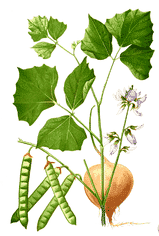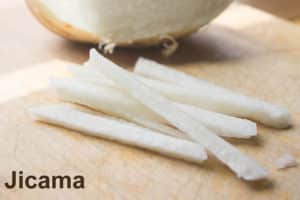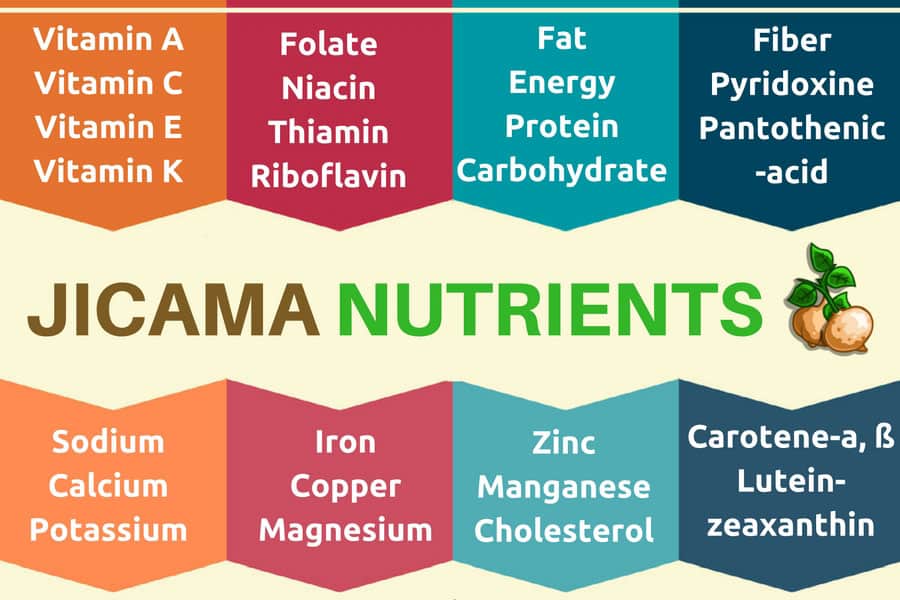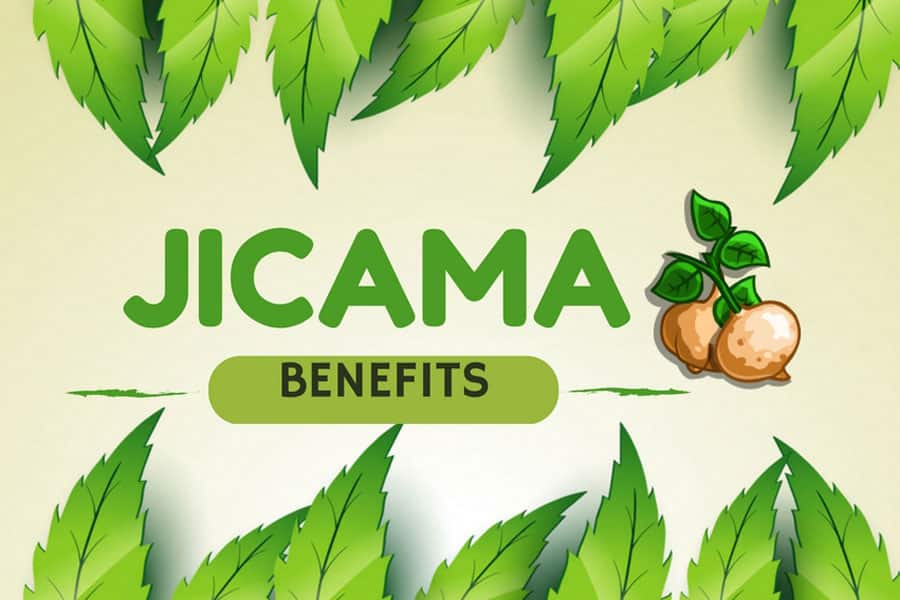
The jicama vegetable is mainly cultivated for its edible and delicious tuberous roots. It is also known as Chinese Potato, yam bean, Chinese turnip, or Mexican potato.
Though we all are well acquainted with potatoes, Jicama is yet another kind of potato that the world is still unaware of. To understand this vegetable better, here is a brief introduction and well-researched information on the multiple health benefits if Jicama.
Introduction To Jicama
 Jicama is a bulbous and large root vegetable. It was initially grown in Mexico. Soon, it spread to Central & South America, and later to China and few other South-east Asian locations. People used it to flavor their dishes.
Jicama is a bulbous and large root vegetable. It was initially grown in Mexico. Soon, it spread to Central & South America, and later to China and few other South-east Asian locations. People used it to flavor their dishes.
It has a sweet, delicious taste with a nice crunchiness, much like a sweet potato. The skin of jicama vegetable is inedible and is white in color.
It can be consumed raw, cooked, or added to soups and salad dressings. There are many varieties of Jicama vegetable available in the market but the two most commonly grown forms are:
- Jicama de leche
- Jicama de agua
The roots of jicama can grow about 2 meters in length and weigh about 20 kilograms (44 pounds), but these are surely extreme sizes, which require between 6 and 9 months of frost-free cultivation time. They can be grown only in warm weathers, making Mexico, China, and a few American regions ideal.
Nutritional Value Of Jicama

Regarding color and consistency, jicama resembles a pear or a potato. Like other root-based vegetables, even jicama is a rich source of starch. However, what makes it unique is the presence of a rare blend of nutrients. It has vitamins C, A, B6, and K. Other nutrients include sodium, potassium, calcium, magnesium, iron, zinc, and manganese.
10 Best Health Benefits Of Jicama Vegetable

Note: Only the roots of jicama plant are edible. The flowers, vines and leaves contain a compound called rotenone, which is a natural insecticide inbuilt in the plant to defend from predators. Hence, consuming any of these plant parts can be highly toxic. For safety, it is best to eat only the underground roots of the plant.
1. Promotes Good Bacterial Growth
One of the best health benefits of Jicama vegetable is the presence of highly vital nutrients and extremely low calories. It offers one-quarter of the recommended everyday fiber intake from just one serving. However, the kind of fiber that jicama offers is often infused with oligofructose inulin. This complex soluble fiber has 0% calories and is not easily metabolized by the body.
An added advantage of Inulin is that it promotes stronger bones by enhancing the absorption of calcium from foods, shielding against osteoporosis. Moreover, inulin has an important prebiotic role when it comes to intestine – it encourages “good” bacterial growth, maintaining a balanced immunity and healthy colon.
2. Fulfills Iron Deficiency
Deficiency in iron can give rise to some dangerous diseases like constant cough, anemia, pre-dialysis anemia, and chronic anemia. Iron is vital for proper growth as well as in the development of the body. Once the iron levels become rigorously exhausted, one is sure to get anemia. Luckily, jicama’s benefits contribute a lot in preventing such health problems.
Jicama fulfills the iron requirement, as it consists of about 0.57 milligrams of iron, which makes it 7.13 percent of the suggested value. Besides treating anemia, jicama also treats several other symptoms of anemia such as body weakness, fatigue, enhanced sensitivity towards cold temperatures, and headache.
3. Aids Weight Loss
Forget those insane workouts and being on strict diets when you are smart enough to help lose your weight in the right way. Adding a mixture of best super foods in your daily diet can do wonders. Among such natural foods, one such is jicama. Since this vegetable is extremely low in calories, it aids in weight loss. 100 grams of jicama (raw) only contains 35 or fewer calories. However, cooked jicama might contain more. So, use a low-calorie oil while cooking jicama, as this will balance your weight loss diet.
4. Maintains A Healthy Brain
Jicama has significant amounts of vitamin B6, a nutrient that is often associated with increased cognitive abilities and brain functionalities. Also, vitamin B6 plays a key role in breaking down all the body proteins into other proteins and useful amino acids, which in turn enhances the metabolic process and effectiveness of several organs.
5. Reduces The Levels Of Homocysteine
Homocysteine is a kind of amino acid that is often listed as one of the independent factors for heart diseases. The levels of homocysteine are extremely high in meat and meat-based products. According to a few studies, homocysteine has also been linked with renal disease. However, one can overcome this problem if he or she consumes jicama on a regular basis.
The vegetable is shown to exhibit strong anti-homocysteine properties; thereby, reducing the elevated levels of this amino acid by 11%. When homocysteine levels are normal, it lessens the risk of cardiovascular problems and renal disorders.
6. Good For Immune System
The health benefits of jicama also contribute to the immune system. The vegetable is a rich source of Vitamin C; a nutrient that not only exhibits antihistamine properties but also is vital for a healthy immune system.
A 100-gram of jicama serving offers about 34% of the recommended everyday amounts of Vitamin C. Also, vitamin c acts as an anti-inflammatory agent. Hence, it is very helpful for individuals who suffer from asthma, frequently sneezing, and cold. These starchy roots reduce wheezing and are helpful in the healing of cold & flu.
7. Maintains Normal Blood Pressure
Due to the presence of potassium in abundant quantities, jicama is highly important for managing a normal blood pressure in the body. The potassium in jicama vegetable acts as a vasodilator (refers to the widening of blood vessels – this activity happens only when the muscle cells located inside the vessels relax. The opposite of vasodilation is narrowing of blood vessels, which can be dangerous at times).
Eating jicama on a regular basis reduces the strain on arteries and blood vessels, thus, lessening the cardiovascular system’s stress. Besides this, potassium also sustains a proper fluid balance throughout the body, which in turn keeps us well hydrated.
8. Proper Blood Flow
Jicama has iron and copper in significant amounts, making it very helpful for the circulatory system. Both these nutrients are vital elements of RBCs (Red Blood Corpuscles). Without them, people start to suffer from anemia and decreased body functioning because when the blood flow is improper, most of the body organs fail to carry oxygenated blood.
9. Improves Mood
Studies have proven that Vitamin-B6 can have a direct effect on the brain’s neurotransmitters — GABA and serotonin. Both are necessary for mood control. They assist in preventing depression, fatigue, anxiety, and pain. Hence, the B6-vitamin is claimed very imperative for enhancing ‘good’ mood and averting major mood disorders.
Research suggests that consuming Jicama fulfills the requirement of Vitamin B6 and helps lift the mood. It helps a person to concentrate more, deals with energy loss and experience less pain. Jicama has 0.04 milligrams of Vitamin-B6, which contributes about 3.08 percent of the suggested value.
10. Treats Elevated Cholesterol Levels
Elevated or high levels of cholesterol are frequently a consequence of unhealthy eating habits. Eventually, it leads to severe health problems like hypertension and heart attack. Multiple studies have shown that individuals who consume more amounts of fiber-rich foods have a reduced risk of cholesterol issues.
Fiber-based diet has powerful detrimental effects on the abnormal cholesterol levels. Among those healthy fiber foods, jicama is one of them. It has high proportions of soluble fiber to reduce the high cholesterol levels as well as stabilize the blood sugar levels. In fact, jicama’s low GI (Glycemic Index) has been reported to be one of the best foods for diabetics too. Each 100-gram jicama serving fulfills 13% of the recommended daily nutrition of soluble fiber.
Side Effects Of Jicama
Every fruit and vegetable have benefits as well as drawbacks. So, jicama is no exception. Make a note of these:
- Only the jicama roots are edible. The other parts of the jicama plant that is – leaves, vines, and flowers are proven to contain rotenone, which is highly toxic.
- Suddenly increasing your fiber intake through jicama can cause digestive problems like constipation and stomachache. Always steam the jicama so that the dietary fiber in them in softened and makes it easier for you to digest.
- The outer peel of jicama is inedible, especially if you are consuming it raw. The peel is not only fibrous and thick but also has a highly toxic compound. So, make sure to peel the skin and consume only the white, fleshy inner part.


